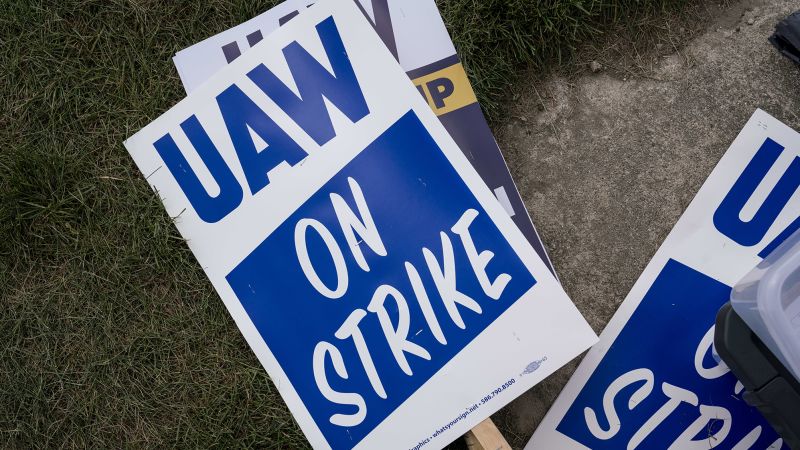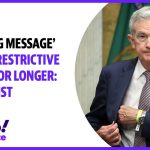The United Auto Workers Union is prepared to strike automakers for “months,” according to leaked messages obtained by CNN.
The messages, between Jonah Furman, Communications Director at the United Auto Workers Union, and other members of the labor community detail personal thoughts about the union’s strategy against the Big Three. The comments broadly confirm what the UAW has publicly said already, and they lay out the union’s willingness to use innovative measures to obtain the best possible deal for its workers.
In one message, Furman wrote “if we can keep them wounded for months, they don’t know what to do… this is recurring reputations damage and operation chaos.”
In another, he writes “The beauty is we’ve laid it all out in public and they’re still helpless to stop it.”
Neither Jonah Furman, nor the UAW responded to requests for comment. Furman is not directly involved in negotiations with the Big Three.
CNN reviewed a series of eight screen shots. The messages were part of a closed messaging group on X, formerly Twitter. The full context of the conversation is unknown, but the participants, who are in the labor community appear to be messaging about general union issues and strategy.
The Detroit Free Press was the first to report the leaked messages.
This is the UAW’s first strike against all of the traditional “Big Three” automakers simultaneously. So far, the strike, which started early last Friday, has targeted only one final assembly plant at each automaker. But UAW President Shawn Fain announced Monday night that it would pick other plants if there is no “substantial progress” in the offers from the automakers.
The union has consistently spoken publicly about its use of new tactics, referring to the ongoing strike as a “Stand-Up Strike,” which hearkens back to the original “Sit-Down Strike” that was formative in the early years of the UAW. Whereas in years past, the UAW would only strike on automaker at a time, shutting it down entirely, during this negotiation the UAW is looking for maximum flexibility, with the ability to call local union leaders and shut down or re-start individual plants at a moment’s notice.
Unions also typically make plans and preparations for long strikes, even ones lasting months.
One advantage for the union of a targeted strike is the potential to save resources and extend a possible strike. The union members who are on strike are eligible for $500 a week in strike benefits from the union’s strike fund.
If all 145,000 UAW members among the three automakers were to strike at the same time, it could cost the fund more than $70 million a week, draining the $825 million fund.
With targeted strikes, it’s possible that the companies will shut down operations and lay off members who are not technically on strike. That could make them eligible to receive state unemployment benefits rather than strike benefits, which could preserve the union’s resources. But there are legal questions about qualifying for unemployment.
Before the strike began, Fain told members that it would be important for members to stay on the job if their plant is not chosen for a strike to give union negotiators the greatest possible power at the bargaining table.
“This is going to create confusion for the companies. It’s going to turbo charge the power of our negotiators,” he told members. “I know there’s a hunger to [have all members] go on strike. That may still happen. This was not done on a whim.”
Stellantis, which made an additional offer to the UAW this week said in a statement; “These reported comments made by the UAW Communications Director are incredibly disturbing and strongly indicate that the UAW’s approach to these talks is not in the best interest of the workforce. We are disappointed that it appears our employees are being used as pawns in an agenda that is not intended to meet their needs.”
“We will not be distracted from our goal, to negotiate an agreement that rewards our employees for their contributions while creating a sustainable future for the company. We strongly encourage our employees to ask their union negotiators to share the details of our offer with them.
John Hatline, who has worked at General Motors for 49 years and has seen his fair share of strikes, told CNN before the strikes began that he thought targeted strikes can work.
“We have used targeted strategies in the past. They have proven effective in helping resolve our contract disputes,” said Hatline, who works at GM’s Factory Zero in Detroit, which builds all electric vehicles. “It saves depletion of our strike fund. Without a substantial strike fund our bargaining power is reduced. When you enter a contract dispute you have to be willing to last one day longer than the company. Or all our sacrificing is for naught.”
General Motors, which put a fifth offer on the table yesterday said in a statement: “It’s now clear that the UAW leadership has always intended to cause months-long disruption, regardless of the harm it causes to its members and their communities. The leaked information calls into question who is actually in charge of UAW strategy and shows a callous disregard for the seriousness of what is at stake.”
“It’s disappointing, to say the least, given what is at stake for our employees, the companies and this region,” said Mark Truby, Chief Communications Officer at Ford. “For our part, we will continue to work, day and night, bargaining in good faith, to reach an agreement that rewards our workforce and allows Ford to invest in a vibrant and growing future.”
Despite this, talks continue this morning with Stellantis, Genal Motors, and Ford, according to a source with knowledge.
The union has said they will expand the strike if solid progress is not made by noon today.
Read the full article here




